Event Archive: 2014-2015
Did you miss a Clough Center event? Explore our archive below for past event information and visit our YouTube page for videos of recent conferences and lectures.
SPRING 2015 LECTURES & CONFERENCES
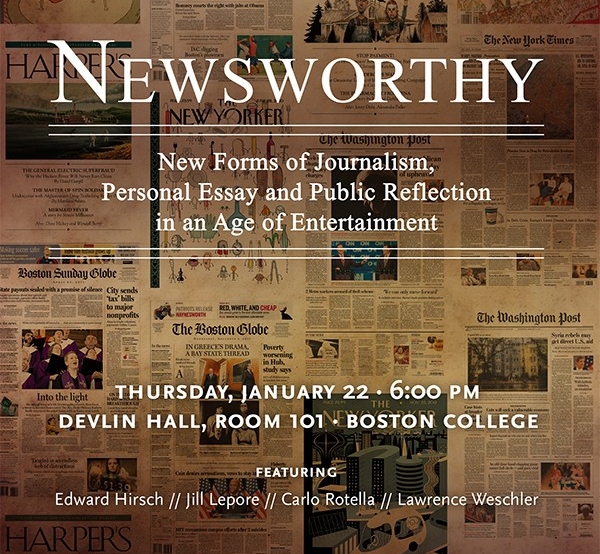
Newsworthy: New Forms of Journalism, Personal Essay and Public Reflection in an Age of Entertainment
Thursday, January 22, 2015
6:00 p.m.
Devlin Hall, Room 101
Effective citizen governance depends upon retaining and restoring legibility, which in the largest sense means restoring the link between the citizen and the information and ideas she needs to govern in the 21st century global environment. However, it is increasingly difficult to find and interpret the information we need to govern ourselves, in an era when the lines between news and opinion, between journalism and entertainment have become alarmingly blurred.
Nevertheless, it need not be the case that all such blurrings of aesthetic boundaries are equally obscuring in their effects on legibility. Experiments in “New Journalism” in the 1970’s and since have combined the aims of traditional reportage with the power of literary techniques to create accounts of social reality at once more accurate and more compelling. Perhaps such journalism and other contemporary media forms contribute to the necessary space for reflection regarding the deeper implications of the day’s news events, and sustain governance in an age of manipulated reactivity and Infotainment.
Edward Hirsch is an American poet and critic. He was born in Chicago in 1950 and was educated at Grinnell College and the University of Pennsylvania, where he received a Ph.D. in Folklore. He has received numerous awards and fellowships, including a MacArthur Fellowship, a Guggenheim Fellowship, an Ingram Merrill Foundation Award, a Pablo Neruda Presidential Medal of Honor, the Prix de Rome, and an Academy of Arts and Letters Award. In 2008, he was elected a Chancellor of the Academy of American Poets.
Edward Hirsch’s first collection of poems, For the Sleepwalkers (1981), received the Delmore Schwartz Memorial Award from New York University and the Lavan Younger Poets Award from the Academy of American Poets. His second collection, Wild Gratitude (1986), won the National Book Critics Award. Since then, he has published six additional books of poems: The Night Parade (1989), Earthly Measures (1994), On Love (1998), Lay Back the Darkness (2003), Special Orders (2008), and The Living Fire: New and Selected Poems (2010), which brings together thirty-five years of poems. Hirsch is also the author of five prose books, including A Poet’s Glossary (2014), Poet’s Choice (2006), How to Read a Poem and Fall in Love with Poetry (1999), and is the editor of Theodore Roethke’s Selected Poems (2005) and co-editor of The Making of a Sonnet: A Norton Anthology (2008).
Edward Hirsch is the recipient of an Academy of Arts and Letters Award, an Ingram Merrill Foundation Award, a Lila Wallace-Reader’s Digest Writers’ Award, and the Rome Prize from the American Academy in Rome, and was awarded fellowships from the Guggenheim Foundation, the MacArthur Foundation, and the National Endowment for the Arts. Hirsch taught for six years in the English department at Wayne State University and seventeen years in the Creative Writing Program at the University of Houston. He is now president of the John Simon Guggenheim Memorial Foundation.
Jill Lepore is an American essayist, writer, and historian. The Kemper Professor of American History at Harvard, she is also a staff writer at The New Yorker. Much of her research, teaching, and writing explores absences and asymmetries of evidence in the historical record. Her current work concerns the histories and technologies of evidence and of privacy.
Lepore received a B.A. in English from Tufts University, an M.A. in American Culture from the University of Michigan, and a Ph.D. in American Studies from Yale University. Her latest book, The Secret History of Wonder Woman, was published in October 2014. Book of Ages: The Life and Opinions of Jane Franklin (2013), which was named Time magazine’s Best Book of the Year, was a finalist for the 2013 National Book Award for Nonfiction, and winner of the Mark Lynton Prize.
Lepore's other works include The Mansion of Happiness: A History of Life and Death (2012), a finalist for the Carnegie Medal for Excellence in Nonfiction, and The Story of America: Essays on Origins (2012), which was shortlisted for the PEN Literary Award for the Art of the Essay, and New York Burning: Liberty, Slavery and Conspiracy in Eighteenth-Century Manhattan (2005), a finalist for the Pulitzer Prize. During a Guggenheim Fellowship year beginning in 2015, Lepore will be working on a book calledDickens in America, an account of the novelist’s 1842 American tour.
Lawrence Weschler is an American author of works of creative nonfiction. He is a graduate of Cowell College of the University of California at Santa Cruz. He was a staff writer at The New Yorker for over twenty years and was a two-time recipient of the George Polk Award (for Cultural Reporting and Magazine Reporting) and a Lannan Literary Award. He has taught previously at Princeton University, Columbia University, the University of California at Santa Cruz, Bard College, Vassar College, Sarah Lawrence College, and New York University.
Weschler’s books of political reportage include The Passion of Poland (1984), A Miracle, A Universe: Settling Accounts with Torturers (1990), and Calamities of Exile: Three Nonfiction Novellas (1998). His “Passions and Wonders” series currently comprises Seeing is Forgetting the Name of the Thing One Sees: A Life of Contemporary Artist Robert Irwin (1982), David Hockney’s Cameraworks (1984); Mr. Wilson’s Cabinet of Wonder (1995), which was shortlisted for both the Pulitzer Prize and the National Book Critics Circle Award, A Wanderer in the Perfect City: Selected Passion Pieces (1998), Boggs: A Comedy of Values (1999), Robert Irwin: Getty Garden (2002), Vermeer in Bosnia (2004), Everything that Rises: A Book of Convergences (2006), which received the National Book Critics Circle Award for Criticism in 2007, and Uncanny Valley: Adventures in the Narrative (2011).
Weschler is currently the director emeritus of the New York Institute for the Humanities at New York University, where he has been a fellow since 1991, and is the artistic director emeritus with the Chicago Humanities Festival. He is a contributing editor to McSweeney’s, the Threepenny Review, and The Virginina Quarterly Review and recently retired from his position as Chair of the Sundance Documentary Film Festival. He is currently a distinguished writer-in-residence at the Carter Journalism Institute at New York University.
Carlo Rotella is the Director of the American Studies Program and Director of the Lowell Humanities Series at Boston College. He received his B.A. at Wesleyan University and received his Ph.D. at Yale University. He regularly writes for The New York Times Magazine and the Washington Post Magazine, is a regular columnist for the Boston Globe, and is a commentator for WGBH FM. Rotella is also an editor of the "Chicago Visions and Revisions" series at the University of Chicago Press.
Rotella’s published works include October Cities (1998), Good With Their Hands; Boxers, Bluesmen, and Other Characters from the Rust Belt (2002), and Cut Time: An Education at the Fights (2003), which was a finalist for the Los Angeles Times Book Prize, and Playing in Time: Essays, Profiles, and Other True Stories (2012). His articles and chapters have also appeared in The New Yorker, Critical Inquiry, American Quarterly, The American Scholar, Raritan, the New York Times, the Chicago Tribune, the Boston Globe, Transition, Harper's, DoubleTake, Boston, Slate, The Believer, TriQuarterly, and The Best American Essays.
Rotella has held Guggenheim, Howard, and Du Bois fellowships and received the Whiting Writers Award, the L. L. Winship/PEN New England Award, and The American Scholar's prizes for Best Essay and Best Work by a Younger Writer. He has also received U.S. Speaker and Specialist Grants from the State Department to lecture in China and Bosnia and Herzegovina. At Boston College, Rotella specializes in American Studies, urban literature and culture, American literature, and creative nonfiction writing.
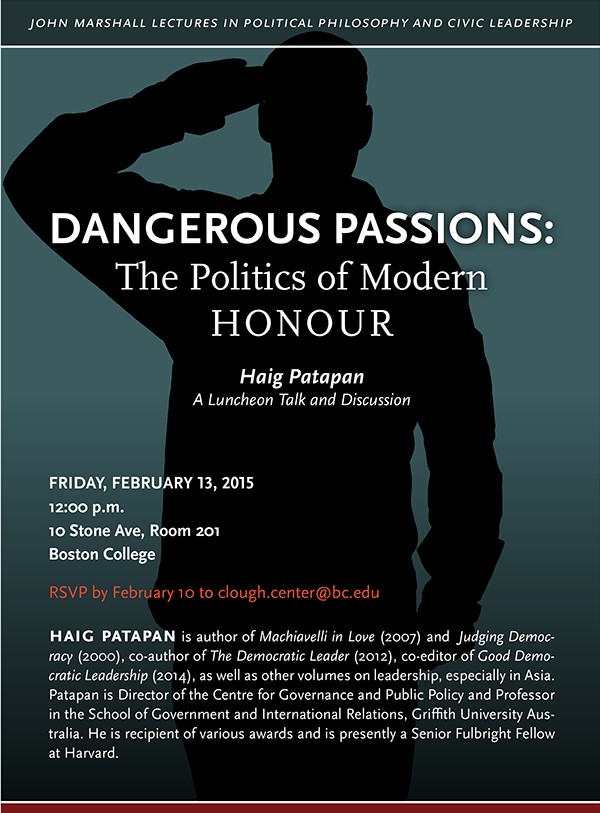
Dangerous Passions: The Politics of Modern Honour
Friday, February 13, 2015
12:00 p.m.
10 Stone Ave, Room 201
Boston College
Haig Patapan is Director of the Centre for Governance and Public Policy and Professor in the School of Government and International Relations. His research interests are in democratic theory and practice, political philosophy, political leadership and comparative constitutionalism. He has published in the foremost political theory journals (History of Political Thought, Review of Politics, and Political Theory), public policy journals (co-winner of the American Society for Public Administration Mosher Award in 2007), and law journals (Melbourne University Law Review; Federal Law Review; Sydney Law Review). His books include Judging Democracy (2000), an examination of judicial politics, jurisprudence and constitutionalism; Machiavelli in Love (2007), a theoretical enquiry into the origins of modern political thought; and a series of co-edited books exploring the changing nature of legitimacy, law and leadership, especially in Asia: Globalisation and Equality (2004); Westminster Legacies (2005); Dissident Democrats (2008); Political Legitimacy in Asia (2011).
Professor Patapan is an authority on democratic leadership, a theme he has explored in a recent co-authored book, The Democratic Leader (OUP, 2012) that investigates the unique strengths and limitations of leadership in democracies, as well as the co-edited collections Dispersed Democratic Leadership (OUP, 2009) and Good Democratic Leadership (OUP, 2014)
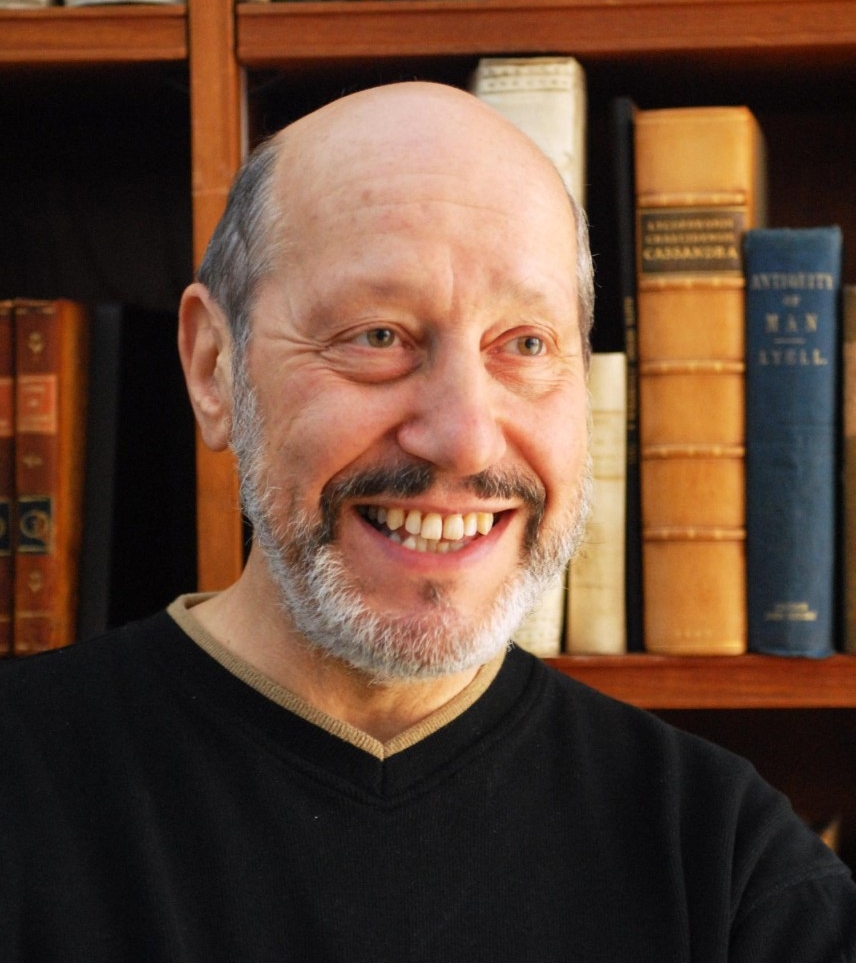
Thomas Jefferson and the French Revolution
Thursday, February 19, 2015
5:00 p.m.
Devlin 101
Jonathan Israel's work is concerned with European and European colonial history from the Renaissance to the eighteenth century. His recent work focuses on the impact of radical thought (especially Spinoza, Bayle, Diderot, and the eighteenth-century French materialists) on the Enlightenment and on the emergence of modern ideas of democracy, equality, toleration, freedom of the press, and individual freedom. His books include European Jewry in the Age of Mercantilism, 1550–1750 (1985); The Dutch Republic: Its Rise, Greatness, and Fall, 1477–1806 (1995); Radical Enlightenment: Philosophy and the Making of Modernity, 1650–1750 (2001); Enlightenment Contested: Philosophy, Modernity, and the Emancipation of Man 1670–1752 (2006); and A Revolution of the Mind: Radical Enlightenment and the Intellectual Origins of Modern Democracy(2009).
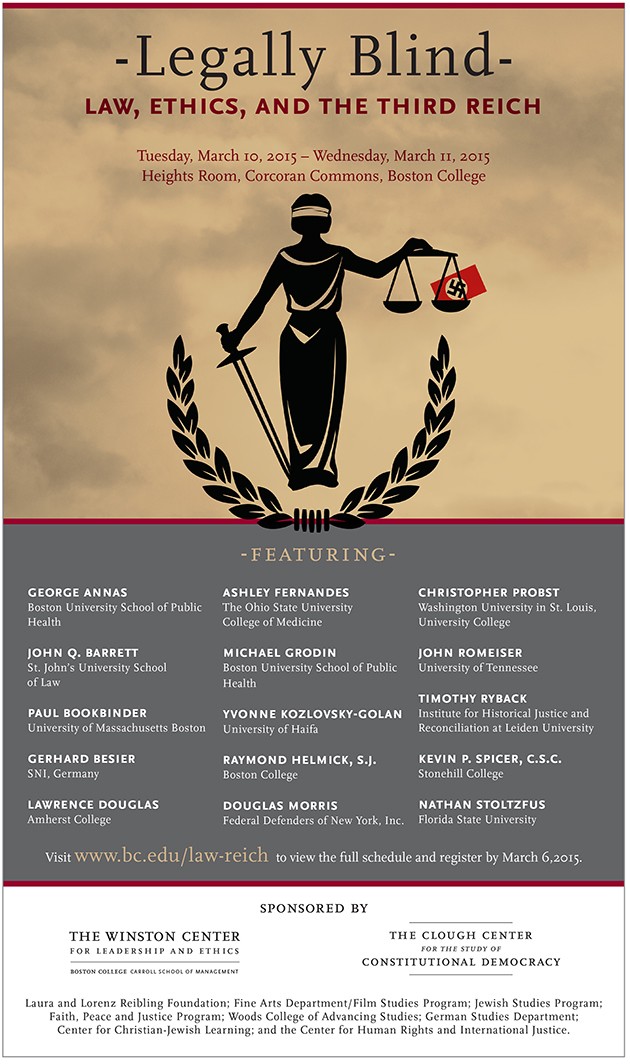
Conference Legally Blind: Law, Ethics, and the Third-Reich
Tuesday, March 10 – Wednesday, March 11, 2015
Heights Room, Corcoran Commons
Boston College
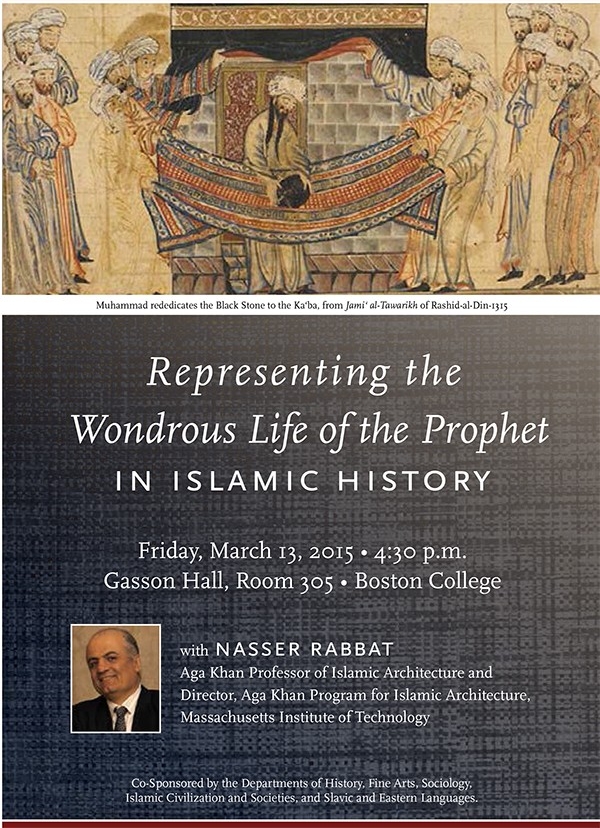
Representing the Wondrous Life of the Prophet in Islamic History
Friday, March 13, 2015
4:30 p.m.
Gasson Hall, Room 305
The Prophet Mohammed led an exemplary life. Generations of scholars, mystics, and literati have collected, preserved, and commented upon his sayings and actions as models to be emulated. Some of these treatises became canonical religious texts; others belong in the domain of adab (belle-lettres) or folklore. A small number have been illustrated. These illustrations span the period from the 12th to the 19th century and come from all corners of the Islamic world. They offer a window into the beliefs, imagination, and cultural references of the artists and their audience. They also constitute a complementary yet distinct discourse from that of the texts, which can be read as a parallel telling of the Prophet’s life story with its own accents, peculiarities, and symbolism.
That is precisely what I will attempt to do in this lecture. Using images from the various schools of Islamic painting, Arabic, Persian, Turkic, and Indian, I will “re-tell” the Prophet’s life story, highlighting the particular moments emphasized in the painterly tradition and explaining their significance. Along the way, I will try to account for the various artistic techniques and representational conventions that informed the depiction of the Prophet across time. My aim is not to present an exact history, but to try to penetrate an aspect of piety and reverence of the Prophet as depicted in Islamic painting that is lost in today’s hardened and ahistorical attitudes that reject the entire tradition.
Nasser Rabbat is the Aga Khan Professor and the Director of the Aga Khan Program for Islamic Architecture at MIT. An architect and a historian, his scholarly interests include the history and historiography of Islamic architecture, art, and cultures, urban history, modern Arab history, contemporary Arab art, and post-colonial criticism.
Professor Rabbat has published more than 100 scholarly articles. His most recent books are: Mamluk History Through Architecture: Building, Culture, and Politics in Mamluk Egypt and Syria (London, 2010), which won the British-Kuwait Friendship Society Prize in Middle Eastern Studies, 2011, al-Mudun al-Mayyita: Durus min Madhih wa-Ru’an li-Mustaqbaliha (The Dead Cities: Lessons from its History and Views on its Future) (Damascus, 2010), and an edited book, The Courtyard House between Cultural Reference and Universal Relevance (London, 2010), and al-Naqd Iltizaman: Nazarat fi-l Tarikh wal ‘Ururba wal Thawra (Criticism as Commitment: Viewpoints on History, Arabism, and Revolution) (Beirut, 2014).
Rabbat worked as an architect in Los Angeles and Damascus. He was a visiting professor at the École des hautes etudes en sciences sociales (EHESS), Paris (2009) and the Ludwig-Maximilians-Universität, Munich (2007). He regularly contributes to a number of Arabic newspapers such as al-Hayat and al-‘Arabi al-Jadid on current political and cultural issues and serves on the boards of various cultural and educational organizations. He also consults with international design firms on projects in the Islamic World and maintains several websites focused on Islamic architecture and urbanism.
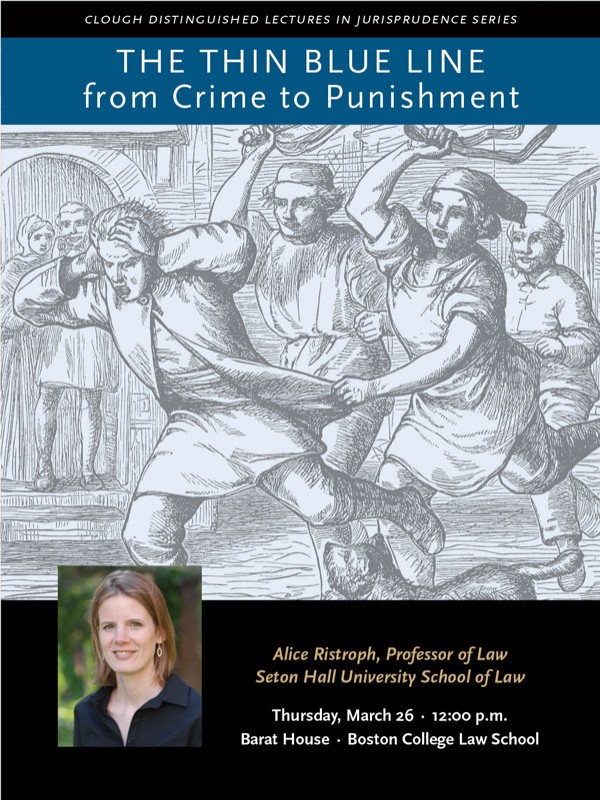
The Thin Blue Line from Crime to Punishment
Thursday, March 26, 2015
12:00 noon
Barat House, Boston College Law School
Alice Ristroph teaches and writes in the fields of criminal law and procedure, constitutional law, and political theory. In these fields, she is interested in the intersections of authority, law, and physical violence. She is currently completing a book about efforts to use the law to reduce or regulate state violence. Her scholarship has appeared in numerous journals, including the Yale Law Journal, the California Law Review, and Constitutional Commentary. She was appointed the Eileen Denner Research Fellow in 2010. Professor Ristroph joined the Seton Hall faculty in 2008 after serving as Associate Professor at the University of Utah S.J. Quinney College of Law. Before she began to teach law, Professor Ristroph was an associate in the litigation department of Paul, Weiss, Rifkind, Wharton & Garrison in New York City. She has a J.D. and a Ph.D. in political theory from Harvard University.
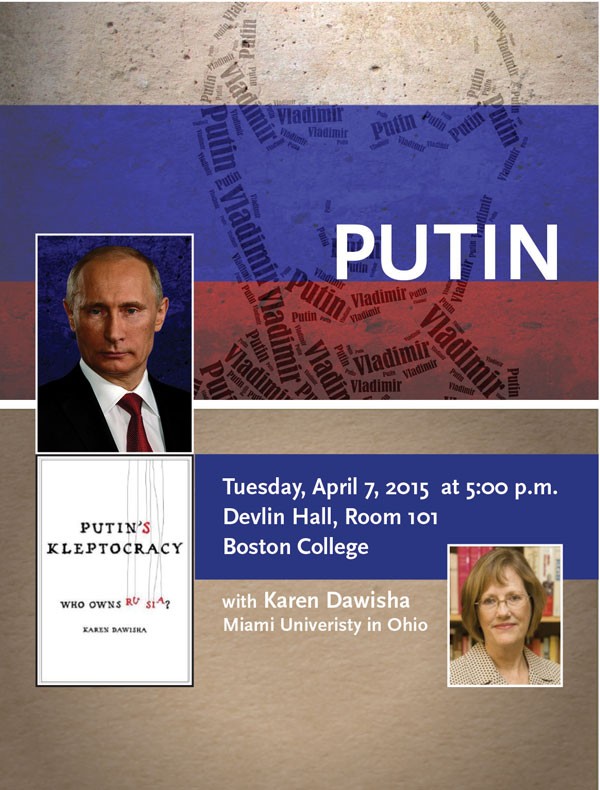
Putin with Karen Dawisha
Tuesday, April 7, 2015
5:00 p.m.
Devlin 101
Karen Dawisha is the Walter E. Havighurst Professor of Political Science in the Department of Political Science at Miami University in Oxford, Ohio, and the Director of the University’s Havighurst Center for Russian and Post-Soviet Studies. She received her Ph.D. from the London School of Economics in 1975 and taught at a number of British and American Universities before coming to Miami with her husband Adeed in 2000. Since coming to Miami, in addition to establishing the Havighurst Center, she has continued to do research and teaching in the areas of post-communist transitions and Russian politics.
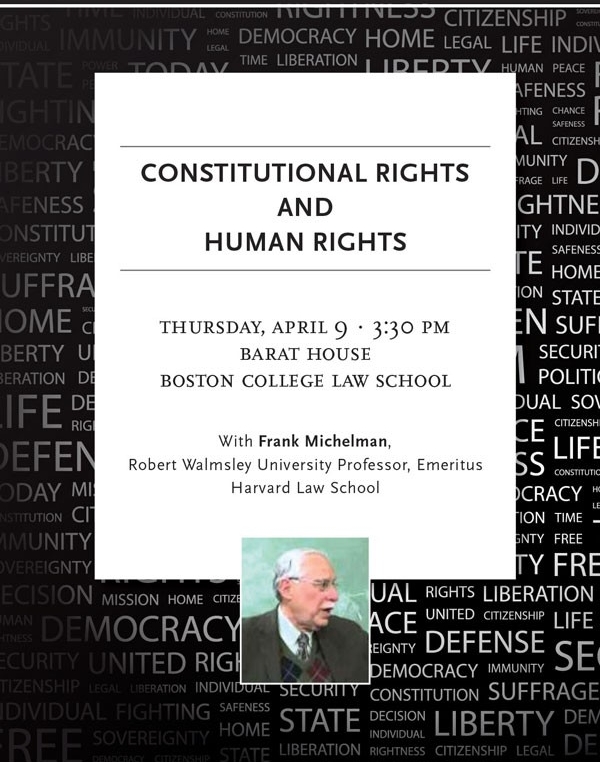
Constitutional Rights and Human Rights
Thursday, April 9, 2015
3:30 p.m.
Barat House
Boston College Law School
Frank Michelman is Robert Walmsley University Professor, Harvard University, where he has taught since 1963. He is the author of Brennan and Democracy (1999), and has published widely in the fields of constitutional law and theory, comparative constitutionalism, South African constitutionalism, property law and theory, local government law, and general legal theory. Professor Michelman is a fellow of the American Academy of Arts and Sciences and a past President (1994-95) of the American Society for Political and Legal Philosophy. He has served on the Committee of Directors for the annual Prague Conference on Philosophy and the Social Sciences, the Board of Directors of the United States Association of Constitutional Law, and the National Advisory Board of the American Constitution Society. In 2005, Professor Michelman was awarded the American Philosophical Society’s Phillips Prize in Jurisprudence and, in 2004, the Brigham-Kanner Property Rights Prize.
Constitutional Rights and Human Rights from Clough Center on Vimeo.
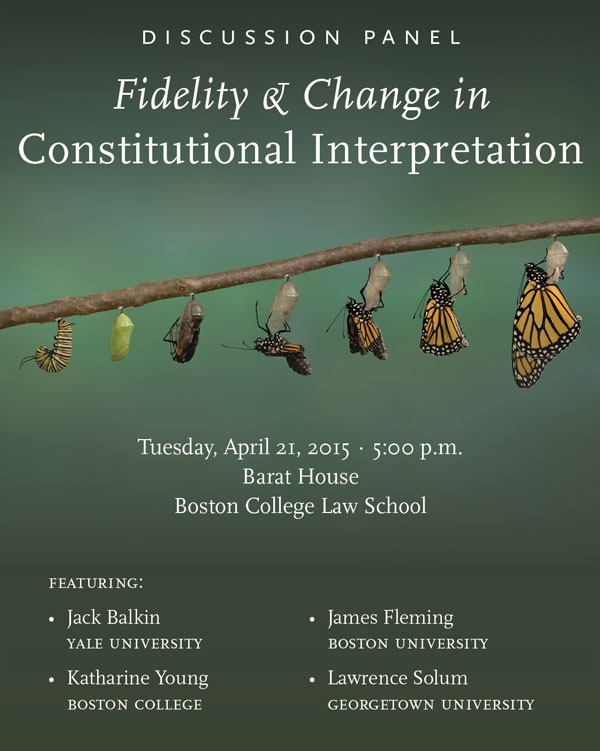
Panel Discussion: Fidelity and Change in Constitutional Interpretation
Tuesday, April 21, 2015
5:00 p.m.
Barat House, Boston College Law School
Jack Balkin is Knight Professor of Constitutional Law and the First Amendment at Yale Law School and the founder and director of Yale's Information Society Project, an interdisciplinary center that studies law and new information technologies, as well as the director of the Knight Law and Media Program and the Abrams Institute for Free Expression at Yale. Professor Balkin received his Ph.D. in philosophy from Cambridge University, and his A.B. and J.D. degrees from Harvard University. He is a member of the American Academy of Arts and Sciences and founded and edits the group blog Balkinization. His books include Living Originalism; Constitutional Redemption: Political Faith in an Unjust World; The Constitution in 2020 (with Reva Siegel); Processes of Constitutional Decisionmaking (5th ed. with Brest, Levinson, Amar, and Siegel); Cultural Software: A Theory of Ideology; The Laws of Change: I Ching and the Philosophy of Life; What Brown v. Board of Education Should Have Said; and What Roe v. Wade Should Have Said.
Katharine Young joined the faculty as Associate Professor in July 2013. Before coming to Boston College, she was an Associate Professor at the Australian National University, and has been a Visiting Assistant Professor at Boston University and a Byse Teaching Fellow at Harvard Law School. Her fields of expertise are economic and social rights, comparative constitutional law and international human rights law.
Professor Young’s recent book, Constituting Economic and Social Rights (OUP, 2012), is published in the Oxford Constitutional Theory series. Other recent publications appear in the Harvard Human Rights Journal, the Harvard Law Review Forum, the International Journal of Constitutional Law, the Australian Year Book of International Law, and the Yale Journal of International Law.
Professor Young completed doctoral and masters studies in law (the S.J.D. and LL.M.) at Harvard Law School and legal studies at Melbourne University and at the University of Heidelberg. She has been a Fellow at Harvard University’s Project on Justice, Welfare and Economics, the Edmond J. Safra Center for Ethics and the Weatherhead Center for International Affairs. Professor Young has professional legal experience in Melbourne, New York, in the United Nations and in an NGO in Accra, Ghana. She served as Clerk for The Hon Michael Kirby AC CMG at the High Court of Australia. At Boston College, she teaches Contracts and Human Rights and Global Poverty.
James Fleming received his J.D. magna cum laude from Harvard Law School and a Ph.D. in Politics from Princeton University. He practiced litigation at Cravath, Swaine & Moore before becoming a law professor. During the 1999-2000 year, he was a Faculty Fellow in Ethics in the Harvard University Center for Ethics and the Professions.
Since coming to Boston University School of Law in 2007, Professor Fleming has organized conferences entitled The Most Disparaged Branch: The Role of Congress in the 21st Century, Justice for Hedgehogs: A Conference on Ronald Dworkin's Forthcoming Book, Justice: What's the Right Thing To Do? A Symposium on Michael Sandel's Recent Book, Originalism and Living Constitutionalism and On Constitutional Obligation and Disobedience. He is organizing a major conference tentatively entitled "America's Political Dysfunction: Constitutional Connections, Causes, and Cures," to be held at Boston University in November 2013. All have been (or will be) published in Boston University Law Review. He is Faculty Advisor to Boston University Law Review.
Before joining the faculty of Boston University School of Law, Fleming was the Leonard F. Manning Distinguished Professor of Law at Fordham University School of Law. While at Fordham, he organized or co-organized many conferences in constitutional theory, including Fidelity in Constitutional Theory, The Constitution and the Good Society, Rawls and the Law and A New Constitutional Order?, together with Theories of Constitutional Self-Government, Integrity in the Law and Theories of Taking the Constitution Seriously Outside the Courts, all published in Fordham Law Review. He also co-edited (with BU Law Professor Linda C. McClain) a symposium on Legal and Constitutional Implications of the Calls to Revive Civil Society, published in Chicago-Kent Law Review. In 2007, Fordham Law Review published a symposium on Minimalism versus Perfectionism in Constitutional Theory, focusing on Professor Fleming's book,Securing Constitutional Democracy, along with Cass R. Sunstein's book, Radicals in Robes.
Lawrence Solum is an internationally recognized legal theorist, who works in constitutional theory, procedure, and the philosophy of law. Professor Solum received his J.D. magna cum laude from Harvard Law School and received his B.A. with highest departmental honors in philosophy from the University of California at Los Angeles. While at Harvard, he served as an Editor of the Harvard Law Review. After graduation, he worked for the law firm of Cravath, Swaine, and Moore in New York, and then clerked for Judge William A. Norris of the United States Court of Appeal for the Ninth Circuit.
Professor Solum was the John E. Cribbet Professor of Law and Professor of Philosophy at the University of Illinois. He was a member of the law faculty of the University of San Diego, where he received the Thornes Prize as Best Teacher. He also taught at Loyola Marymount University and has been a Visiting Professor of Law at Boston University, at the University of Southern California, and, before joining the faculty, at Georgetown Law.
Professor Solum served as a White Paper Author for the Committee on Alternative Court Structures of the Commission on the Future of the California Judiciary, and he has also served the Association of American Law Schools (AALS) twice as Chair of the Jurisprudence Section, as Chair of the Section on Constitutional Law, as Chair of the Section on Law and Interpretation, as Chair of the Committee on Scholarship, and as a Member of the Committee to Review Scholarly Papers.
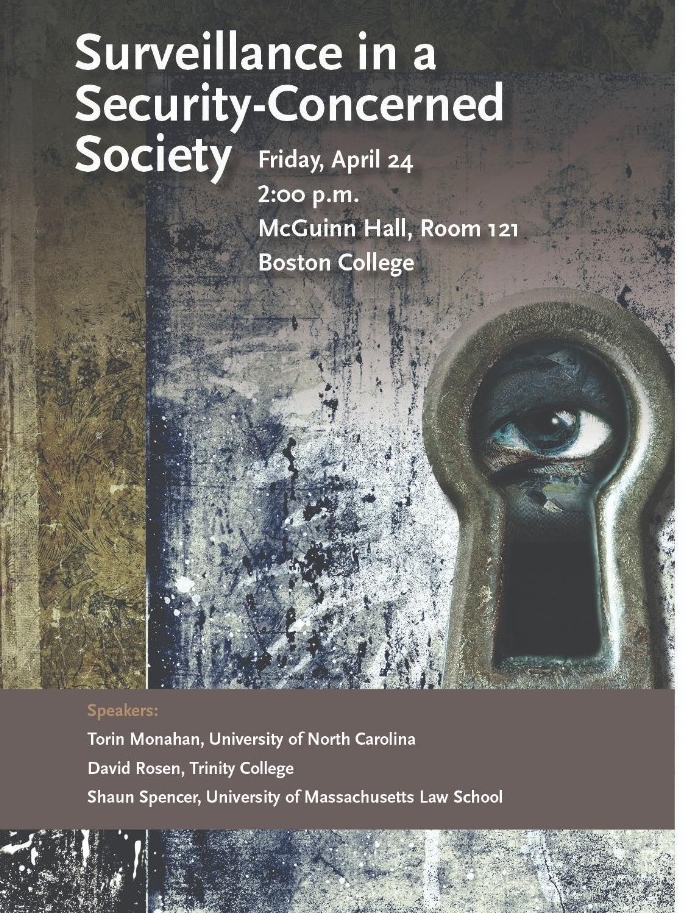
Surveillance in a Security-Concerned Society
Friday, April 24, 2015
2:00 p.m.
McGuinn Hall, Room 121
Boston College
Torin Monahan is a professor of Communication Studies at the University of North Carolina. His book Surveillance in the Time of Insecurity won the Surveillance Studies Book Prize in 2011. Dr. Monahan has written two other books on the topic, has coauthored two more, and Monahan is an associate editor of the leading academic journal on surveillance, Surveillance & Society. He is currently overseeing an NSF-funded project, which investigates the data-sharing practices of the Department of Homeland Security "fusion centers", sites oriented toward the provision of national security.
David Rosen is a Professor of English at Trinity College. He and Aaron Santesso recently authored a widely-acclaimed book titled The Watchman in Pieces: Surveillance, Literature, and Liberal Personhood, which won Modern Language Association’s James Russell Lowell Prize. He has also written as well as a number of scholarly articles on surveillance from a literary perspective.
Shaun Spencer is a Professor of Law and the Director of Legal Skills and the University of Massachusetts School of Law. He has previously taught at Harvard Law School as well as Boston College Law School. He is an expert in privacy law and has authored numerous academic articles on privacy and surveillance, including most recently an examination of how the law treats the privacy of information entitled “The Surveillance Society and the Third-Party Privacy Problem.”
FALL 2014 LECTURES & CONFERENCES
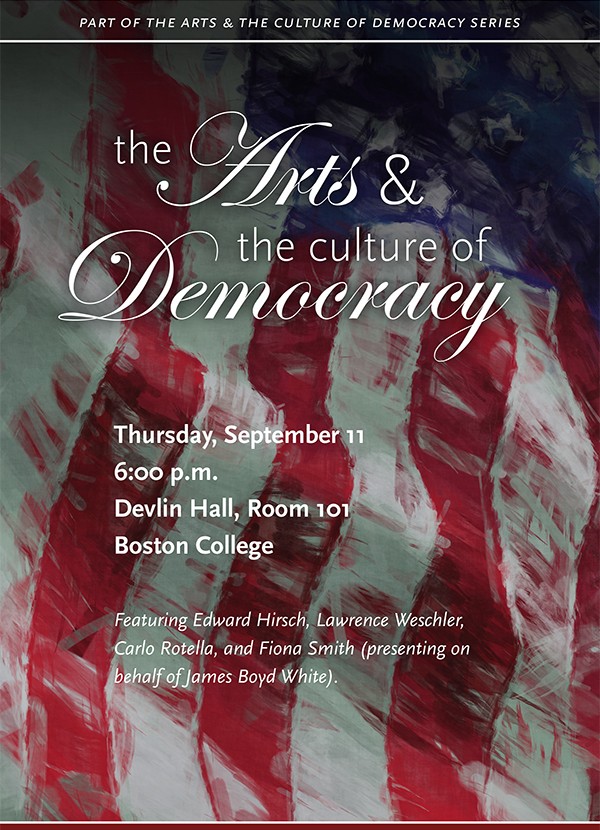
The Arts and the Culture of Democracy
Thursday, September 11, 2014
6:00 p.m.
Devlin Hall, Room 101
There is a conversation between the arts and democracy that is vital but often invisible, and which sustains and contributes to that human flourishing we hope for from democratic society. What is the nature of that conversation? While there may be tension between any kind of explicit political agenda and great art, can we say that the arts give to democratic culture a picture of human thriving that reminds us we are not yet done with the question of what it is to pursue happiness?
Edward Hirsch is an American poet and critic. He was born in Chicago in 1950 and was educated at Grinnell College and the University of Pennsylvania, where he received a Ph.D. in Folklore. He has received numerous awards and fellowships, including a MacArthur Fellowship, a Guggenheim Fellowship, an Ingram Merrill Foundation Award, a Pablo Neruda Presidential Medal of Honor, the Prix de Rome, and an Academy of Arts and Letters Award. In 2008, he was elected a Chancellor of the Academy of American Poets.
Edward Hirsch’s first collection of poems, For the Sleepwalkers (1981), received the Delmore Schwartz Memorial Award from New York University and the Lavan Younger Poets Award from the Academy of American Poets. His second collection, Wild Gratitude (1986), won the National Book Critics Award. Since then, he has published six additional books of poems: The Night Parade (1989), Earthly Measures (1994), On Love (1998), Lay Back the Darkness (2003), Special Orders (2008), and The Living Fire: New and Selected Poems (2010), which brings together thirty-five years of poems. Hirsch is also the author of five prose books, including A Poet’s Glossary (2014), Poet’s Choice (2006), How to Read a Poem and Fall in Love with Poetry (1999), and is the editor of Theodore Roethke’s Selected Poems (2005) and co-editor of The Making of a Sonnet: A Norton Anthology (2008).
Edward Hirsch taught for six years in the English department at Wayne State University and seventeen years in the Creative Writing Program at the University of Houston. He currently serves as the President of the John Simon Guggenheim Memorial Foundation and is a Chancellor of the Academy of American Poets.
Fiona Smith is a Professor of International Economic Law at the School of Law at the University of Warwick. She is a graduate of the University of Wales, where she received her LL.B., and the University of Leicester, where she obtained her LL.M. and Ph.D. Her research interests are in international economic law, particularly the law of the World Trade Organization (WTO). She has published widely on WTO law and is an expert on international agricultural trade, and has spoken widely about her research in the United States, Europe, and East Asia. As a consequence of her work, she was invited to become a member of the editorial board of the journal Jurisprudence and was also appointed as an expert on international economic law to the Research Foundation Flanders.
Smith was first introduced to James Boyd White’s work when she was a Visiting Scholar at the University of Minnesota in 2008. She was inspired to use White’s work as a methodology for her own work on international agricultural trade regulation, arguing that pro-environmental reforms were never fully incorporated into trade agreements due to differences in use of language between environmentalists and trade lawyers, and that this difference must be abridged. She has also edited a symposium on Law and Language published by Oxford University Press, and is currently working on a book on food security in international economic law, which also incorporates White’s ideas about the power of language and the use of speech.
Smith is the Founding and now Co-Director of the WTO Scholar’s Forum, an initiative designed to bring together experts on the law of the World Trade Organization to discuss topical issues. She recently completed a two-year project entitled Food Security, Foreign Direct Investment and Multilevel Governance in Weak States with support from a grant from the Swiss National Fund. Before joining the University of Warwick, Smith previously taught at the University College of London, the University of Sheffield, and the University of Leicester.
Professor Smith will be discussing the work of James Boyd White at this event.
James Boyd White is an American law professor, literary critic, scholar, and philosopher who is credited for founding the “Law and Literature” movement. White is a graduate of Amherst College, Harvard Law School, and Harvard Graduate School, where he obtained an M.A. in English. After graduation from law school, White spent a year as a Sheldon Fellow in Europe and practiced law in Boston for two years. He began his teaching career at the University of Colorado Law School and also was a professor at both the Law School and College of the University of Chicago.
He has published numerous books: The Legal Imagination (1973), Constitutional Criminal Procedure (1976), When Words Lose Their Meaning: Constitutions and Reconstitutions of Language, Character, and Community (1984), Heracles' Bow: Essays in the Rhetoric and Poetics of the Law (1985), Justice as Translation: An Essay in Cultural and Legal Criticism(1990), "This Book of Starres": Learning to Read George Herbert (1994), Acts of Hope: The Creation of Authority in Literature, Law, and Politics (1994), From Expectation to Experience: Essays on Law and Legal Education (2000), The Edge of Meaning (2001); and in 2006, both Living Speech: Resisting the Empire of Force and an edited volume, How Should We Talk About Religion?
White has served as a governor of the Chicago Council of Lawyers and is a member of the American Law Institute and the American Academy of Arts and Sciences. He has received fellowships from the Guggenheim Foundation and the National Endowment for the Humanities, and was a Phi Beta Kappa Visiting Scholar in 1997-98. He is currently a professor of English emeritus and the L. Hart Wright Collegiate Professor.
Lawrence Weschler is an American author of works of creative nonfiction. He is a graduate of Cowell College of the University of California at Santa Cruz. He was a staff writer at The New Yorker for over twenty years and was a two-time recipient of the George Polk Award (for Cultural Reporting and Magazine Reporting) and a Lannan Literary Award. He has taught previously at Princeton University, Columbia University, the University of California at Santa Cruz, Bard College, Vassar College, Sarah Lawrence College, and New York University.
Weschler’s books of political reportage include The Passion of Poland (1984), A Miracle, A Universe: Settling Accounts with Torturers (1990), and Calamities of Exile: Three Nonfiction Novellas (1998). His “Passions and Wonders” series currently comprises Seeing is Forgetting the Name of the Thing One Sees: A Life of Contemporary Artist Robert Irwin (1982), David Hockney’s Cameraworks (1984); Mr. Wilson’s Cabinet of Wonder (1995), which was shortlisted for both the Pulitzer Prize and the National Book Critics Circle Award, A Wanderer in the Perfect City: Selected Passion Pieces (1998), Boggs: A Comedy of Values (1999), Robert Irwin: Getty Garden (2002), Vermeer in Bosnia (2004), Everything that Rises: A Book of Convergences (2006), which received the National Book Critics Circle Award for Criticism in 2007, and Uncanny Valley: Adventures in the Narrative (2011).
Weschler is currently the director emeritus of the New York Institute for the Humanities at New York University, where he has been a fellow since 1991, and is the artistic director emeritus with the Chicago Humanities Festival. He is a contributing editor to McSweeney’s, the Threepenny Review, and The Virginina Quarterly Review and recently retired from his position as Chair of the Sundance Documentary Film Festival. He is currently a distinguished writer-in-residence at the Carter Journalism Institute at New York University.
Carlo Rotella is the Director of the American Studies Program and Director of the Lowell Humanities Series at Boston College. He received his B.A. at Wesleyan University and received his Ph.D. at Yale University. He regularly writes for The New York Times Magazine and the Washington Post Magazine, is a regular columnist for the Boston Globe, and is a commentator for WGBH FM. Rotella is also an editor of the "Chicago Visions and Revisions" series at the University of Chicago Press.
Rotella’s published works include October Cities (1998), Good With Their Hands; Boxers, Bluesmen, and Other Characters from the Rust Belt (2002), and Cut Time: An Education at the Fights (2003), which was a finalist for the Los Angeles Times Book Prize, and Playing in Time: Essays, Profiles, and Other True Stories (2012). His articles and chapters have also appeared in The New Yorker, Critical Inquiry, American Quarterly, The American Scholar, Raritan, the New York Times, the Chicago Tribune, the Boston Globe, Transition, Harper's, DoubleTake, Boston, Slate, The Believer, TriQuarterly, and The Best American Essays.
Rotella has held Guggenheim, Howard, and Du Bois fellowships and received the Whiting Writers Award, the L. L. Winship/PEN New England Award, and The American Scholar's prizes for Best Essay and Best Work by a Younger Writer. He has also received U.S. Speaker and Specialist Grants from the State Department to lecture in China and Bosnia and Herzegovina. At Boston College, Rotella specializes in American Studies, urban literature and culture, American literature, and creative nonfiction writing.
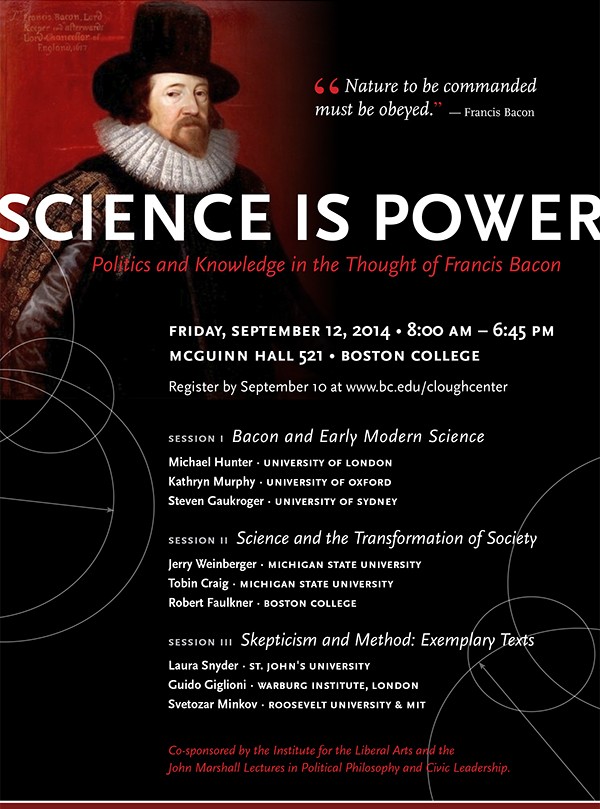
Symposium Science is Power: Politics and Knowledge in the Thought of Francis Bacon
Friday, September 12, 2014
8:00 a.m. – 6:45 p.m.
McGuinn Hall, Room 521
Boston College
This one-day conference focuses on Bacon’s seminal plan to master nature by a methodical experimentalism. Leading scholars from around the world will discuss the premises of this natural science and its relation to radical political, social, and cultural reform.
Co-sponsored by the Institute for the Liberal Arts at Boston College.
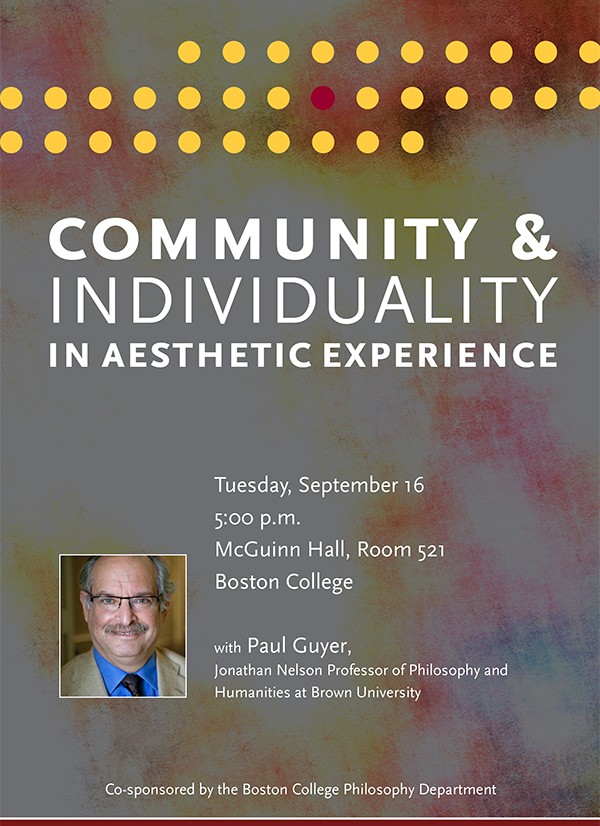
Community and Individuality in Aesthetic Experience
Tuesday, September 16
5:00 p.m.
McGuinn Hall, Room 521
Paul Guyer is the inaugural Jonathan Nelson Professor of Philosophy and Humanities at Brown University.
Having written nine books on Immanuel Kant and translated a number of the philosopher’s works into English, he is widely regarded as one of world’s foremost Kantian scholars. His scholarship has been particularly influential in interpreting Kant’s views on aesthetics, transcendental idealism, and freedom. Additionally, Professor Guyer has published on the history of aesthetics and modern philosophy, and on other historical figures in philosophy, including John Locke, David Hume, Georg Wilhelm Friedrich Hegel, Arthur Schopenhauer, and others.
Professor Guyer graduated summa cum laude from Harvard College. After receiving his Ph.D. at Harvard University with a dissertation directed by Stanley Cavell, he taught at the University of Pittsburgh, the University of Illinois-Chicago, and the University of Pennsylvania. He has held fellowships from the National Endowment for the Humanities, the John Simon Guggenheim Memorial Foundation, and the Princeton University Center for Human Values. Professor Guyer’s awards include the Centennial Medal of the Harvard Graduate School of Arts and Sciences, the Franklin J. Matchette Prize of the American Philosophical Association, and the Research Prize of the Alexander von Humboldt Foundation.
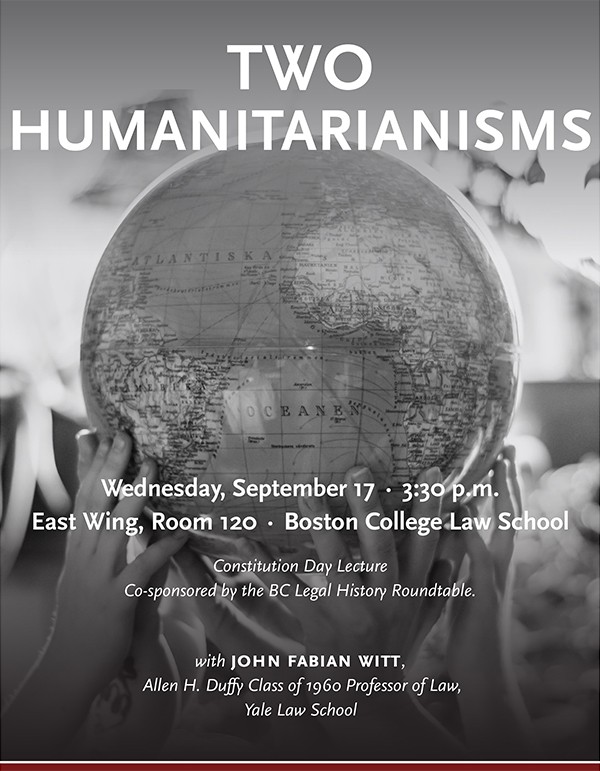
Two Humanitarianisms
Wednesday, September 17
3:30 p.m.
East Wing 120, Boston College Law School
John Witt is the Allen H. Duffy Class of 1960 Professor of Law at Yale Law School, where he teaches courses in American Legal History, Torts, and History of the Laws of War.
After receiving his B.A., J.D., and Ph.D. in History—all from Yale University—Professor Witt served as a law clerk to Judge Pierre N. Leval on the United States Court of Appeals for the Second Circuit. Subsequently, he became a professor of law at Columbia University before returning to Yale in his current position. In 2010 he was awarded a John Simon Guggenheim Memorial Foundation Fellowship to continue his project on the laws of war in American history.
Professor Witt’s most recent book, Lincoln’s Code: The Laws of War in American History, was awarded the 2013 Bancroft Prize, was a finalist for the Pulitzer Prize, was selected for the American Bar Association's Silver Gavel Award, and was a New York Times Notable Book for 2012. His previous works include Patriots and Cosmopolitans: Hidden Histories of American Law and The Accidental Republic: Crippled Workingmen, Destitute Widows, and the Remaking of American Law—which was awarded the 2002 Thomas J. Wilson Prize for its examination of the development of American tort law at the turn of the 20th century.
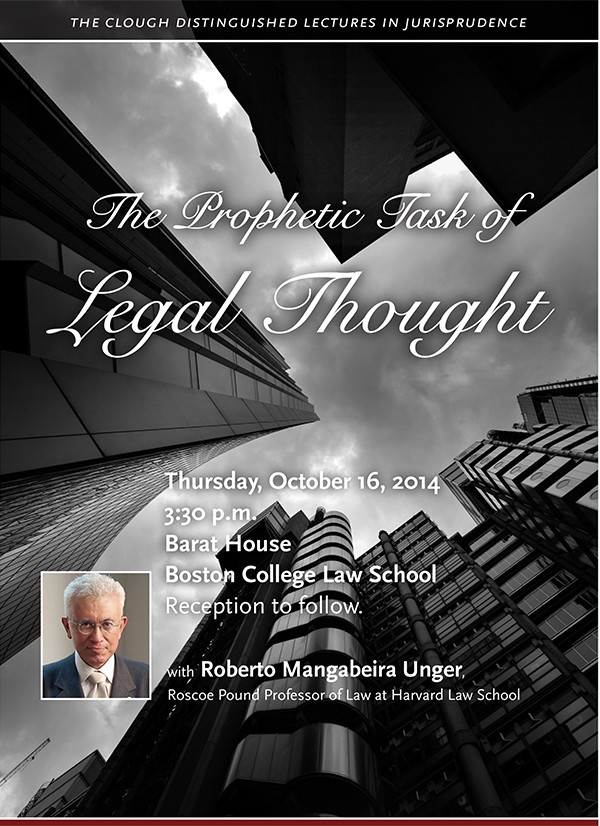
The Prophetic Task of Legal Thought
Thursday, October 16
3:30 p.m.
Barat House, Boston College Law School
Roberto Mangabeira Unger is a renowned theorist whose political activity helped bring about democracy in Brazil in the 1980s. Successfully bridging the gap between theory and politics in both the United States and Brazil, he is widely recognized as one of the world’s leading public intellectuals.
Raised in both the United States and Brazil, Unger subsequently studied law at the Federal University of Rio de Janeiro and completed his LL.M. at Harvard Law School. Due to political upheaval in Brazil, he was invited to stay at Harvard in the S.J.D. program. Unger first received recognition with the publication of his books Knowledge and Politics and Law in Modern Society in 1975 and 1976, respectively. At the same time, he became one of the youngest tenured faculty members at Harvard Law School at just 29 years old. His scholarship—which encompasses social theory, legal thought, economics, and philosophy—has focused on how to empower humanity. Through it, Unger has emphasized the need for experimentation and revision as an alternative to institutionalized social, political, and economic activity.
Unger became involved in Brazilian politics in the 1970s, when he emerged as one of the ideological leaders opposing the country’s military dictatorship. Following Brazil’s democratization, he has served as an adviser to two presidential candidates, headed a state-run foundation for homeless children, and launched his own exploratory bids for the presidency in 2000 and 2006. His political activity culminated in his appointment from 2007 to 2009 as the Brazilian Minister of Strategic Affairs under President Luiz Inácio Lula da Silva, a position that allowed him to push for a broadening of the middle class through an expansion of credit to smaller producers. Since then, Unger has focused his political work on the northwestern Brazilian state of Rondônia, where he is heading efforts to modernize farming techniques and to transform education from rote learning to creative engagement.
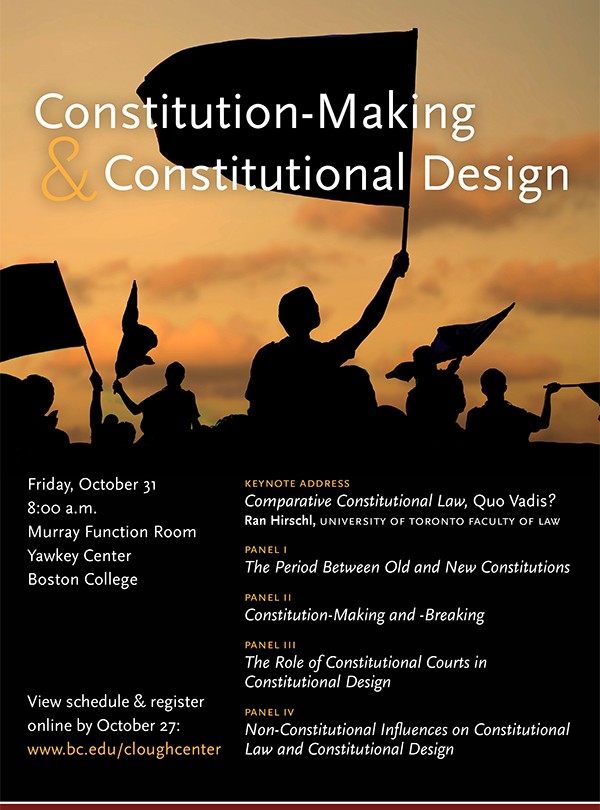
Symposium on Constitution-Making and Constitutional Design
Friday, October 31
8:30 a.m. – 6:30 p.m.
Murray Function Room, Yawkey Center
EVENT SCHEDULE
| 8:00 a.m. | Continental Breakfast |
| 8:30 a.m. | Opening Remarks Vlad Perju, Director of the Clough Center and Professor, Boston College Law School Introduced by Richard Albert, Boston College Law School |
8:45 a.m.
| Panel 1: The Period Between Old and New Constitutions MODERATOR: Richard Kay, University of Connecticut School of Law What is a Constitutional Transition? Constitutional Transition: Conventional Legal Systems and Conventional States Navigating Constitutional Crises: The Reference Power as a Tool of Transition Constitutions and Constitutional Orders Constitutional Ruthlessness Constitutional Stickiness |
| 10:15 a.m. | Break |
10:30 a.m.
| Panel 2: Constitution-Making and -Breaking MODERATOR: Mila Versteeg, University of Virginia School of Law Revolution and Negotiation in the Constituent Process: Questions of Time and Sequence Constraining Constitutional Replacement The Upstream Problem in Constitutionalism Designing Constitution-Making Processes |
12:00 p.m.
| Lunch Keynote Comparative Constitutional Law, Quo Vadis? Introductions by Richard Albert, Boston College Law School and Eugene Mazo, Wake Forest University School of Law |
1:30 p.m.
| Panel 3: The Role of Constitutional Courts in Constitutional Design MODERATOR: Ruti Teitel, New York Law School Judicial Review and Constitutional Specificity The Geographical Dimensions of New Constitutional Courts The Law of Constitution-Making Judicial Review of Constitutional Amendments and New Constitutions in Comparative Perspective |
| 3:00 p.m. | Break |
3:15 p.m.
| Panel 4: Non-Constitutional Influences on Constitutional Law and Constitutional Design MODERATOR: Katharine Young, Boston College Law School The Conventions of Constitutional Amendment in Canada The Administrative State, the Rule of Law, and Democracy: Comparative Models of Judicial Review Paradoxes of Islamic Law and Constitutionalism The Implementation of Constitutional Rights by Statute Germany’s Civil Law Constitution International Institutions in Ukraine's Constitutional Change |
4:45 p.m.
| Closing Remarks Darin Johnson, Esq., Chief of Staff, Office of the Special Coordinator for Middle East Transitions (2012-2014), U.S. Department of State Introduced by Richard Albert, Boston College Law School |
| 5:00 p.m. | Reception |
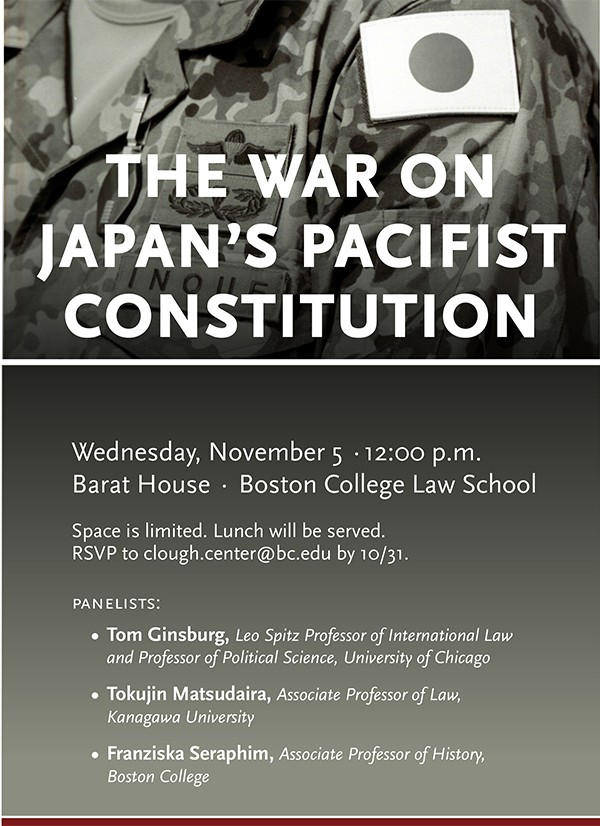
The War on Japan's Pacifist Constitution
Panel Discussion
Wednesday, November 5
12:00 p.m.
Barat House, Boston College Law School
Tom Ginsburg is the Leo Spitz Professor of International Law and Professor of Political Science at the University of Chicago. He is primarily known as a scholar of international and comparative law, with a focus on constitutions and East Asia.
Professor Ginsburg holds a B.A. in Asian Studies, a J.D., and a Ph.D. in Jurisprudence and Social Policy from the University of California at Berkeley. Before entering legal academia, he worked for the Asia Foundation, served as a legal advisor at the Iran-U.S. Claims Tribunal in The Hague, and consulted with international development agencies and foreign governments on democratic governance.
Professor Ginsburg has served as a visiting professor at the University of Tokyo, Kyushu University, Seoul National University, the Interdisciplinary Center Herzliya, the University of Pennsylvania, and the University of Trento. He currently co-directs the Comparative Constitutions Project, a National Science Foundation-funded effort to analyze the constitutions of all independent nation-states since 1789. His books include Judicial Review in New Democracies (2003), which won the C. Herman Pritchett Award from the American Political Science Association for best book on law and courts; The Endurance of National Constitutions (2009); Constitutions in Authoritarian Regimes (2014); and Law and Development in Middle-Income Countries (2014).
Tokujin Matsudaira is an Associate Professor of Law at Kanagawa University. Professor Matsudaira received his BA in Law from the University of Tokyo, and an LL.M. in Asian and Comparative Law from the University of Washington School of Law. He also completed the PhD program from the University of Tokyo Graduate School of Law and Politics.
Professor Matsudaira is a member of the International Society of Public Law, the Japan Public Law Association, and the Japan Association for Studies of Constitutional Law. He also serves as the coordinator of the Comparative Constitutional Law Forum for Young Scholars.
Franziska Seraphim is an associate professor of history at Boston College. A historian of modern and contemporary Japan, her work has focused on the contested place of Japan’s empire and war in Asia in postwar politics, society, and culture.
Professor Seraphim holds a B.A.in Asian Studies from the University of California at Berkeley and an M.A., M.Phil., and Ph.D. in Japanese History from Columbia University. Since joining the Boston College faculty, she has offered several courses on Japan, Asia, and World War II, including surveys of modern Japan and topical courses on the Asia-Pacific War and Japanese society since 1945. Her seminars have focused on the Allied Occupations of Japan and Germany, the place of memory in history, and comparative and transnational history writing.
Professor Seraphim’s publications include War Memory and Social Politics in Japan, 1945-2005; “Relocating War Memory at Century’s End: Japan’s Postwar Responsibility and Global Public Culture,” in Ruptured Histories: War and Memory in Post-Cold War Asia; and “Japan,” in Encyclopedia of Genocide and Crimes against Humanity. Currently, she is researching questions of rehabilitation and citizenship in the politics of social integration and exclusion after World War II in Japan and Germany.
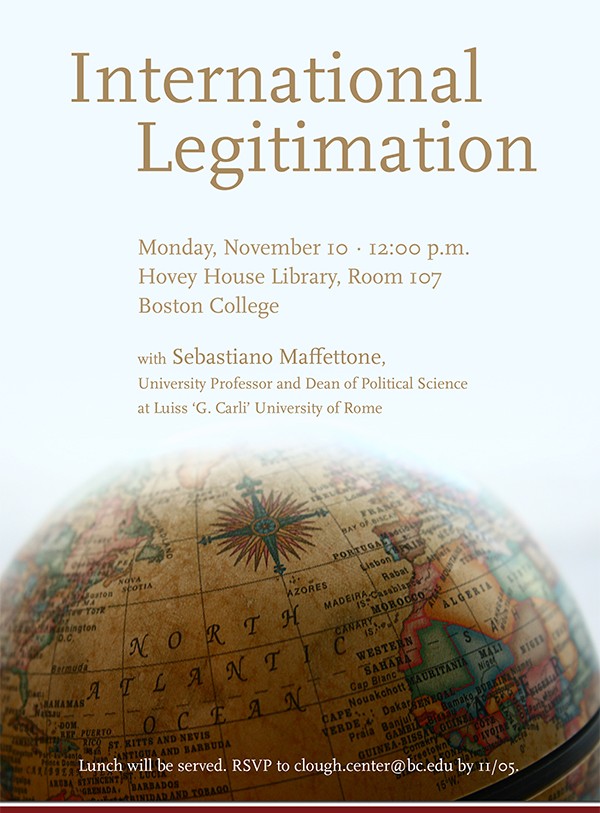
International Legitimation with Sebastiano Maffettone
Monday, November 10, 2014
12:00 p.m.
Hovey House Library, Room 107
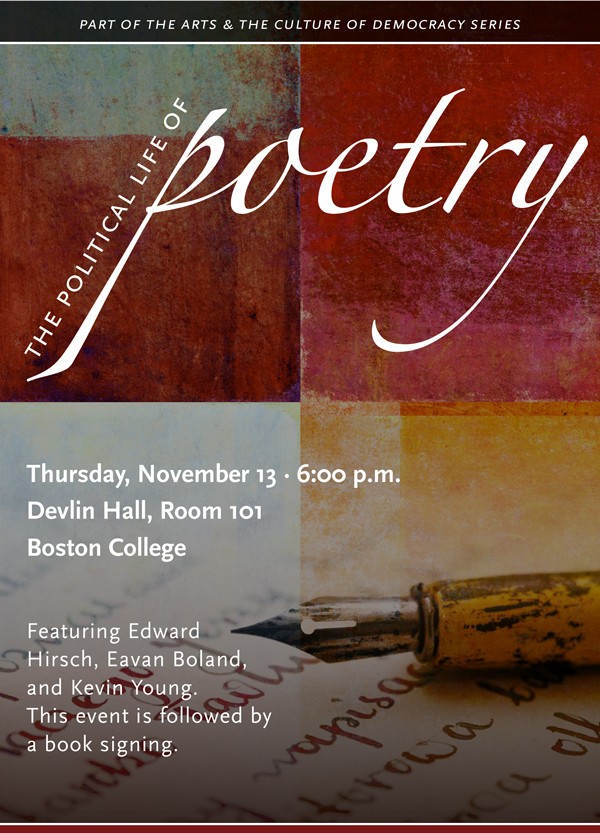
The Political Life of Poetry
Thursday, November 13, 2014
6:00 p.m.
Devlin Hall, Room 101
It is sometimes said that American poets speak narcissistically or solipsistically, with little sense of history or political engagement of the sort that characterizes Eastern European or Latin American poetic traditions. Others have argued that all poetry is a political act, and in this sense American poets are enacting democratic freedoms by not overtly engaging with political issues. How might American poetry potentially give meaning to events, locating them in a larger context and story, shuttling back and forth in time, and including all the riches of its institutional memory?
Edward Hirsch is an American poet and critic. He was born in Chicago in 1950 and was educated at Grinnell College and the University of Pennsylvania, where he received a Ph.D. in Folklore. He has received numerous awards and fellowships, including a MacArthur Fellowship, a Guggenheim Fellowship, an Ingram Merrill Foundation Award, a Pablo Neruda Presidential Medal of Honor, the Prix de Rome, and an Academy of Arts and Letters Award. In 2008, he was elected a Chancellor of the Academy of American Poets.
Edward Hirsch’s first collection of poems, For the Sleepwalkers (1981), received the Delmore Schwartz Memorial Award from New York University and the Lavan Younger Poets Award from the Academy of American Poets. His second collection, Wild Gratitude (1986), won the National Book Critics Award. Since then, he has published six additional books of poems: The Night Parade (1989), Earthly Measures (1994), On Love (1998), Lay Back the Darkness (2003), Special Orders (2008), and The Living Fire: New and Selected Poems (2010), which brings together thirty-five years of poems. Hirsch is also the author of five prose books, including A Poet’s Glossary (2014), Poet’s Choice (2006), How to Read a Poem and Fall in Love with Poetry (1999), and is the editor of Theodore Roethke’s Selected Poems (2005) and co-editor of The Making of a Sonnet: A Norton Anthology (2008).
Edward Hirsch is the recipient of an Academy of Arts and Letters Award, an Ingram Merrill Foundation Award, a Lila Wallace-Reader’s Digest Writers’ Award, and the Rome Prize from the American Academy in Rome, and was awarded fellowships from the Guggenheim Foundation, the MacArthur Foundation, and the National Endowment for the Arts. Hirsch taught for six years in the English department at Wayne State University and seventeen years in the Creative Writing Program at the University of Houston. He is now president of the John Simon Guggenheim Memorial Foundation.
Eavan Boland is an Irish poet, author of ten volumes of poetry. Born in Dublin, Ireland, she spent her childhood in London and New York, returning to Ireland to attend secondary school in Killiney and university at Trinity College Dublin. Her poetry has been influenced by her experiences as a young wife and mother and her growing awareness of the troubled role of women in Irish history and culture. Over the course of her long career, Boland emerged as one of the foremost female voices in Irish literature. Boland has taught at Trinity College Dublin, University College Dublin, Bowdoin College, and was a member of the International Writing Program at the University of Iowa.
Boland’s books of poetry include Domestic Violence (2007), Against Love Poetry (2001), The Lost Land (1998), An Origin Like Water: Collected Poems 1967–1987 (1996), In a Time of Violence (1994), Outside History: Selected Poems 1980–1990 (1990), The Journey and Other Poems (1986), Night Feed (1982), and In Her Own Image (1980). In addition to her books of poetry, Boland is also the author of Object Lessons: The Life of the Woman and the Poet in Our Time (1995), a volume of prose, and is the co-editor of The Making of a Poem: A Norton Anthology of Poetic Forms (2000). Her most recent prose book is A Journey with Two Maps: Becoming a Woman Poet (2011). A new volume of poetry, A Woman Without a Country, is due to be published by W. W. Norton in November 2014.
Boland has received the Lannan Award for Poetry and an American Ireland Fund Literary Award. She was poet-in-residence at the National Maternity Hospital during its 1994 Centenary and has also been the Hurst Professor at Washington University and Regent’s Lecturer at the University of California at Santa Barbara. She is a tenured Professor of English at Stanford University where she is the Director of the Creative Writing Program.
Kevin Young is an American poet, essayist and editor. He is a graduate of Harvard University, where he obtained an A.B. in English and American Literature, and Brown University, where he obtained his MFA. Young’s poetry and essays have appeared in The New Yorker, The Paris Review, The Kenyon Review, Callaloo, and many other journals and anthologies. He is also a Guggenheim Foundation Fellow, a NEA Literature Fellow in Poetry, a United States Artists James Baldwin Fellow, and was a Stegner Fellow in Poetry at Stanford University.
Young is the author of eight books of poetry and editor of seven other collections, including Ardency: A Chronicle of the Amistad Rebels (2011), winner of an American Book Award, and Jelly Roll (2003), a finalist for the National Book Award and winner of the Paterson Poetry Prize. He most recently edited The Collected Poems of Lucille Clifton 1965-2010 and The Hungry Ear: Poems of Food and Drink. His non-fiction book, The Grey Album: Music, Shadows, Lies (2012) won the Graywolf Nonfiction Prize. Young’s other poetry collections include Books of Hours (2014), Dear Darkness (2008), and For The Confederate Dead (2007).
In addition to the Paterson Poetry Prize, Young has been the recipient of the PEN Open Award and the 2012 American Book Award. Young is currently the Atticus Haygood Professor of Creative Writing and English and curator of Literary Collections and the Raymond Danowski Poetry Library at Emory University in Atlanta.
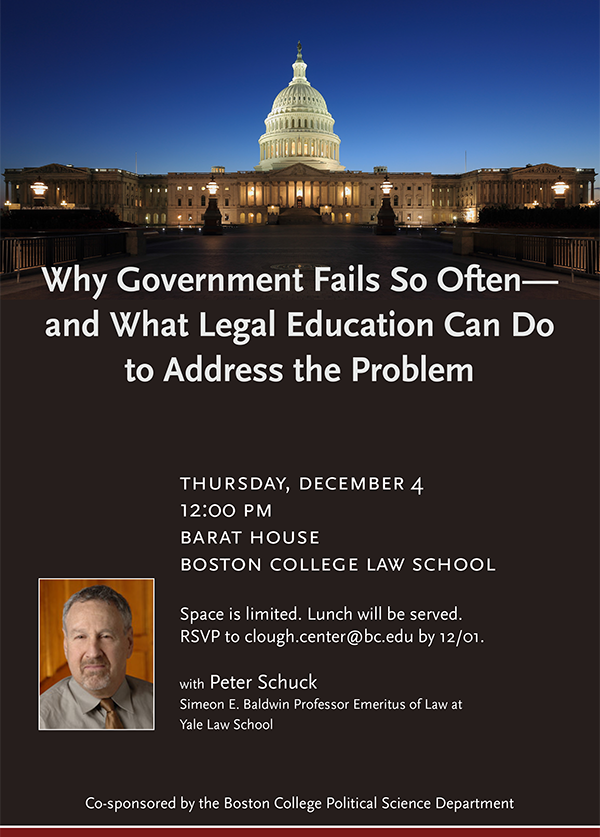
Why Government Fails So Often and What Legal Education Can Do to Address the Problem
Thursday, December 4, 2014
12:00 p.m.
Barat House, Boston College Law School
Peter H. Schuck is the Simeon E. Baldwin Professor Emeritus of Law at Yale Law School, where he has held the chair since 1984. He has also served as Deputy Dean. His major fields of teaching and research are tort law; immigration, citizenship, and refugee law; groups, diversity, and law; and administrative law.
His most recent books include Targeting in Social Programs: Avoiding Bad Bets, Removing Bad Apples; Meditations of a Militant Moderate: Cool Views on Hot Topics; Immigration Stories; Foundations of Administrative Law; Diversity in America: Keeping Government at a Safe Distance; and The Limits of Law: Essays on Democratic Governance. He is also co-editor, with James Q. Wilson, of Understanding America. He is a member of the American Law Institute's advisory committee for the Restatement of Torts (Third), Basic Principles, and a contributing editor to The American Lawyer.
Prior to joining Yale, he was Principal Deputy Assistant Secretary for Planning and Evaluation in the U.S. Department of Health, Education, and Welfare. Professor Schuck holds a B.A. from Cornell, a J.D. from Harvard Law School, an LL.M. in International Law from N.Y.U., and an M.A. in Government from Harvard.

